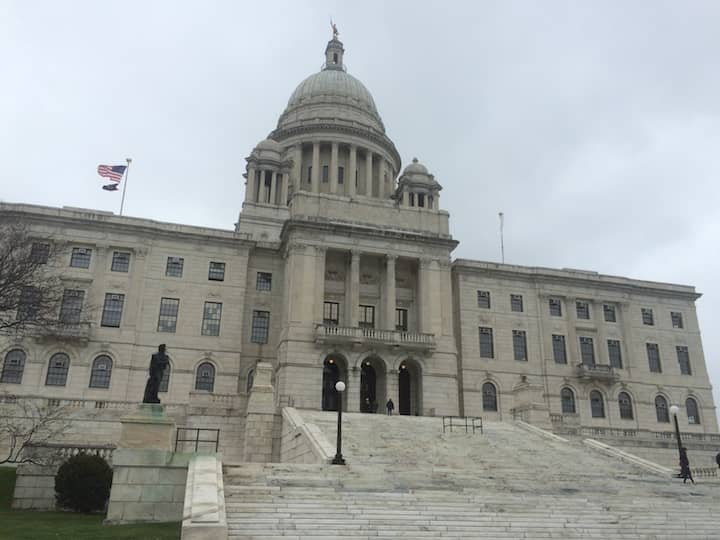

Editor’s note: The following report was provided by the Legislative Press and Information Bureau.
STATE HOUSE — The House Committee on Health, Education and Welfare heard testimony on legislation submitted by Rep. Joseph M. McNamara (D-Dist. 19, Warwick, Cranston) that would allow terminally ill patients to obtain experimental drugs that have not yet been federally approved but which may be in the final stages of FDA testing.
The legislation (2018-H 7294) would create the Neil Fachon Rhode Island Terminally Ill Patients Right to Try Act of 2018, which would establish the conditions for the use of experimental treatments.
The legislation is named for Neil Fachon, a 19-year-old East Greenwich resident who was diagnosed with diffuse intrinsic pontine glioma (DIPG), an aggressive tumor that diffuses throughout the glial tissue in the brain stem. Neil was accepted into a newly opened clinical trial, but because of governmental red tape, he was denied the drug for a period of time. He passed away on Feb. 19, 2017. Testifying on behalf of the bill was Neil’s parents, Wendy and Dean Fachon.
“Over one million Americans die from a terminal illness every year,” Fachon told the committee. “How would you feel if one day your child, your brother, or your best friend was diagnosed with an incurable disease? Unfortunately, FDA red tape and government regulations restrict access to promising new treatments, and for those who do get access, it’s often too late. The FDA drug approval process can take up to 15 years. This is far too long for dying patients to wait.”
“Right to Try” laws have been approved in several states, including 24 over the last two years, and more are poised to consider such legislation this year.
“While many people see Right to Try as a chance to find a cure, it is also about finding ways to live a longer with those we love,” said Wendy Fachon. “It is about allowing people the freedom to choose how they want to spend the remainder of their life – whether that means giving their life to serve as a subject for medical research or it means living without the ravages of radiation and chemotherapy, which fail to cure. Neil bravely chose to do something different, and in June, when doctors expected him to be dead, he was living at home, eating well, walking up and down stairs, and going out with friends. Neil lived a good quality of life through the Thanksgiving holiday, without physical pain, while following his daily ANP protocol.”
Terminal patients who have exhausted their conventional treatment options have few, if any places, to turn. They can attempt to enroll in a clinical trial, but many of the sickest individuals do not qualify. The only other option for them is to obtain potentially life-saving drugs by requesting that the U.S. Food and Drug Administration grant them expanded access. But only a few hundred patients are granted such access each year because of the complicated, time-consuming and expensive process currently required by the FDA.
“The one thing everyone tries to hold onto is hope — hope that the individual will get well, hope that some procedure will lead to a cure,” said Representative McNamara, who chairs the Committee on Health, Education and Welfare. “I want Rhode Island to do all it can to give these people hope. I want Rhode Island to give terminally ill patients the ‘right to try’ anything that might help them. Access to experimental treatments will provide terminally-ill patients with the fundamental right to control the decisions relating to their own medical care.”
Under the McNamara bill, a terminally ill patient may make a request for an experimental drug and a manufacturer of an experimental drug, biological produce or device may make it available, but is not required to do so. The legislation provides protections for all parties (patients and medical professionals) and insurance companies are also protected because there is no requirement for them to cover the cost of any investigational drugs.
“Terminal patients do not have the time to wait for the kinds of delays associated with federal bureaucracy,” said Representative McNamara. “Terminal patients just want the chance to try something — anything — that might help. It is my desire, through this legislation, to give them hope and, perhaps, to extend or save some lives.”
The legislation is cosponsored by Representatives Antonio Giarrusso (R-Dist. 30, East Greenwich, West Greenwich), Joseph J. Solomon Jr. (D-Dist. 22, Warwick), Grace Diaz (D-Dist. 11, Providence) and Carlos E. Tobon (D-Dist. 58, Pawtucket). Sen. Erin Lynch Prata (D-Dist. 31, Warwick, Cranston) is sponsoring companion legislation (2018-S 2401) in the Senate.
This is a test
